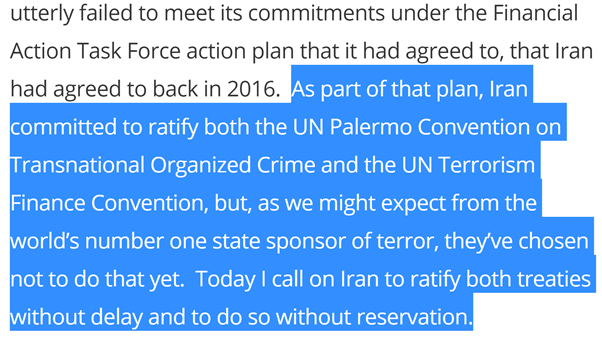Of course, it wasn't.
Here's what you should know. Thread 👇
FATF has 36 member countries including the largest financial centers in the world.
Member countries can adopt all, some, or none of FATF's recommendations. There are basically no repercussions for not adopting (or for violating) FATF recommendations.
FATF doesn't rule on anything & exchanges only have to follow FATF's recommendations if they're adopted as law in a relevant jurisdiction.
Not really.
In fact, the more important the financial center, the less likely it is to hand over control of its regulatory regime to an international organization like FATF.
FinCEN (the US regulator in charge of AML/CFT regulation) certainly does consider FATF's recommendations, but rarely adopts them wholesale.
The evaluation looked at how well the US had complied with FATF's AML/CFT recommendations from 2012. FATF concluded that the US had a "well-developed and robust" system . . .
FATF suggested specific enhancements for the US to adopt, such as regulations for "designated non-financial businesses & professionals" like lawyers, accountants & high-end real estate agents.
How many regulations do you think FinCEN has adopted for lawyers, accountants & real estate agents? Yeah, zero. They've barely even considered it, in fact.
That's particularly true in the US, given that FinCEN just released its own crypto-related guidance last month.
I'll direct you to @coincenter's write-up for the details, but the short version is that FATF and FinCEN are basically on the same page. FATF isn't saying anything new or frightening for the crypto industry.
coincenter.org/entry/the-upco…
- should apply to intermediaries that control customers' assets, like centralized exchanges & custodial wallets
- should *not* apply to those who solely develop or sell an application or platform, like software engineers
This may be different for jurisdictions with less comprehensive regulations, but crypto is probably the least of their worries.
It could've been much worse, at least. As I said about FinCEN last month, if a government wants to kill crypto, the AML/CFT laws are likely the easiest way to do it without passing new legislation.
FATF instead acknowledges that crypto has "the potential to spur financial innovation and efficiency and improve financial inclusion." Good!
- not the law & maybe never will be
- very similar to what FinCEN already said
- rightly focused on custodians, not developers
- a good sign for government acceptance of crypto
Now we wait & see what member countries do with it.
[end]









